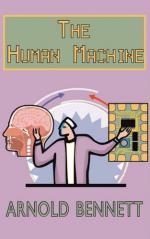It is useless for a man in the habit of losing or mislaying his temper to argue with himself that such a proceeding is folly, that it serves no end, and does nothing but harm. It is useless for him to argue that in allowing his temper to stray he is probably guilty of cruelty, and certainly guilty of injustice to those persons who are forced to witness the loss. It is useless for him to argue that a man of uncertain temper in a house is like a man who goes about a house with a loaded revolver sticking from his pocket, and that all considerations of fairness and reason have to be subordinated in that house to the fear of the revolver, and that such peace as is maintained in that house is often a shameful and an unjust peace. These arguments will not be strong enough to prevail against one of the most powerful and capricious of all habits. This habit must be met and conquered (and it can be!) by an even more powerful quality in the human mind; I mean the universal human horror of looking ridiculous. The man who loses his temper often thinks he is doing something rather fine and majestic. On the contrary, so far is this from being the fact, he is merely making an ass of himself. He is merely parading himself as an undignified fool, as that supremely contemptible figure—a grown-up baby. He may intimidate a feeble companion by his raging, or by the dark sullenness of a more subdued flame, but in the heart of even the weakest companion is a bedrock feeling of contempt for him. The way in which a man of uncertain temper is treated by his friends proves that they despise him, for they do not treat him as a reasonable being. How should they treat him as a reasonable being when the tenure of his reason is so insecure? And if only he could hear what is said of him behind his back!...
The invalid can cure himself by teaching his brain the habit of dwelling upon his extreme fatuity. Let him concentrate regularly, with intense fixation, upon the ideas: ’When I lose my temper, when I get ruffled, when that mysterious vibration runs through me, I am making a donkey of myself, a donkey, and a donkey! You understand, a preposterous donkey! I am behaving like a great baby. I look a fool. I am a spectacle bereft of dignity. Everybody despises me, smiles at me in secret, disdains the idiotic ass with whom it is impossible to reason.’
Ordinarily the invalid disguises from himself this aspect of his disease, and his brain will instinctively avoid it as much as it can. But in hours of calm he can slowly and regularly force his brain, by the practice of concentration, to familiarise itself with just this aspect, so that in time its instinct will be to think first, and not last, of just this aspect. When he has arrived at that point he is saved. No man who, at the very inception of the fire, is visited with a clear vision of himself as an arrant ass and pitiable object of contempt, will lack the volition to put the fire out. But, be it noted, he will not succeed until he can do it at once. A fire is a fire, and the engines must gallop by themselves out of the station instantly. This means the acquirement of a mental habit. During the preliminary stages of the cure he should, of course, avoid inflammable situations. This is a perfectly simple thing to do, if the brain has been disciplined out of its natural forgetfulness.




